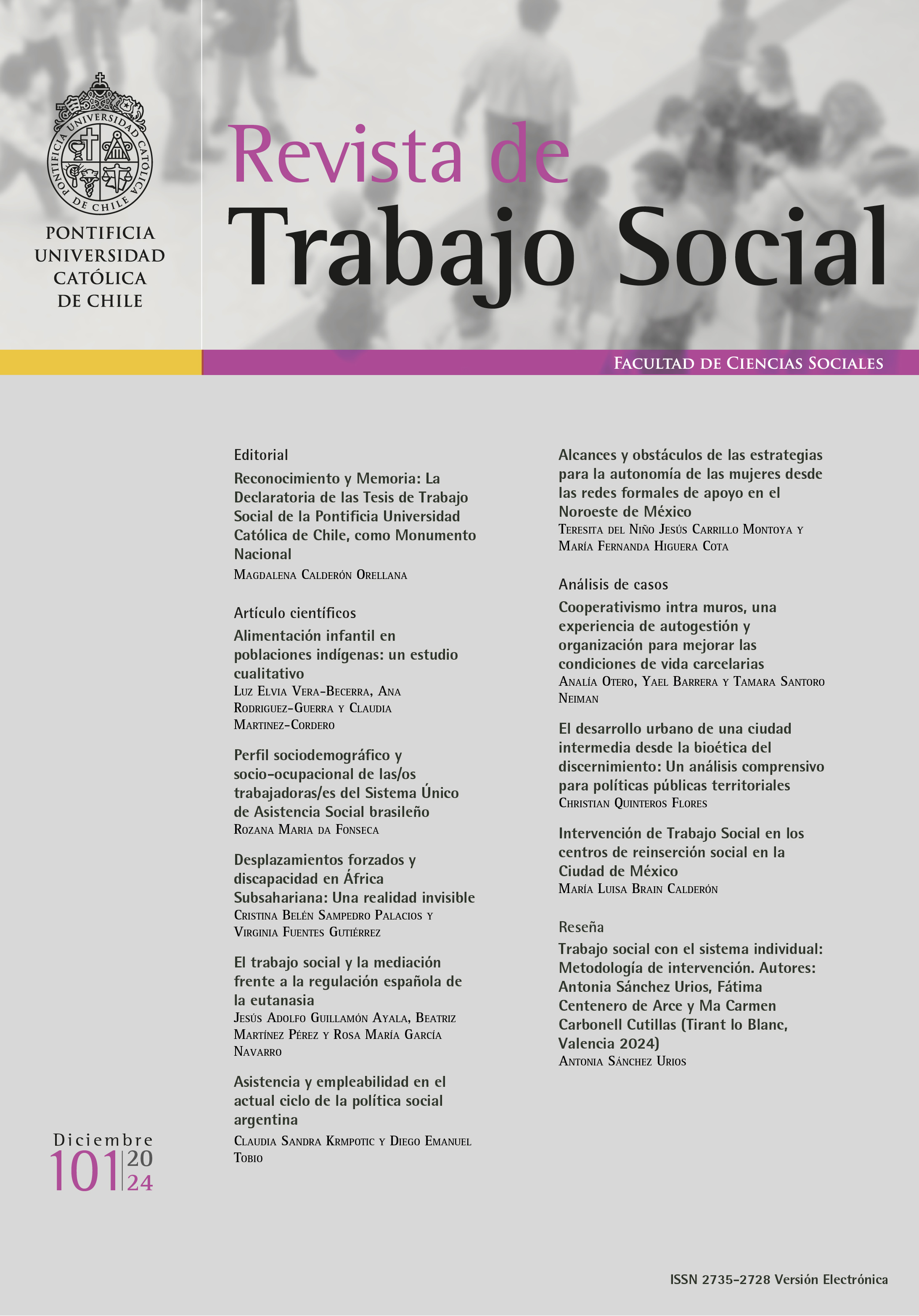Sociodemographic and socio-occupational profile of workers in the Brazilian Unified Social Assistance System
DOI:
https://doi.org/10.7764/rts.101.170-186Palabras clave:
Unique Social Assistance System, sociodemographic profile, socio-occupational profile, BrazilResumen
Introduction: The Social Assistance Policy (NSAP), approved in 2004, marks a significant milestone in Brazilian public policy by guaranteeing citizenship rights and enhancing social inclusion. Emerging post-democracy transition, NSAP addresses former paternalistic and nepotistic tendencies in social aid. Drawing from the 1988 Constitution, the policy emphasizes equitable support for vulnerable groups, underscored by principles of universality, decentralization, and participation. It laid the foundation for the Unified Social Assistance System (USAS), crucial for coordinated service delivery to marginalized communities. Objective: This study aimed to analyze the sociodemographic and socio-occupational characteristics of professionals employed within the Unified Social Assistance System (USAS). Method: The methodology involved the distribution of online questionnaires focused on demographic and occupational aspects, ensuring adherence to ethical research guidelines and promoting the voluntary participation of individuals working in social assistance. Results: The study finds a pronounced feminization trend, with 88.6% women and only 11.4% men. The largest representations are from São Paulo, Minas Gerais, and Rio Grande do Sul, reflecting a workforce concentration in populous areas. Racial composition shows 52.2% identifying as white and 45.7% as black, indicating significant representation of black professionals. However, this data points to the need for a broader examination of workforce diversity. Less than 2% reported disabilities, spotlighting areas for inclusivity enhancement. In terms of educational attainment, a sizable 58.8% of participants possessed postgraduate qualifications, and 24.5% completed higher education. The workforce predominantly comprises psychology (44%) and social work (42%) professionals, reflecting the critical expertise needed in social services. Most workers (> four years’ experience) operate within the public sector (94%), highlighting the public institution's pivotal role in policy implementation. Despite 62.2% having statutory contracts ensuring job stability, many workers reported low job security, with around 30% holding multiple jobs to offset low salaries, revealing compensation inadequacies relative to their job complexity. The role of Higher-Level Technician (68.8%) is prevalent, covering substantial responsibilities in service and program management. Despite employment challenges, a majority (72.8%) are committed to the profession, indicating a dedicated workforce amidst adversity. The discussion underscores the female dominance within USAS, continuing a historic trend. While black professionals feature significantly, a lack of comprehensive ethnic-racial data limits exhaustive diversity analysis. High educational levels starkly contrast with financial instability, as three out of ten need additional jobs. Geographic worker concentration in southern and southeastern Brazil highlights resource and opportunity disparities, suggesting the need for strategic investment in less-represented regions to ensure comprehensive nationwide support for vulnerable populations. Employment conditions present challenges with temporary contracts and limited resources affecting service delivery. This precariousness complicates professionals' effectiveness, necessitating integrated strategies emphasizing continued education, enhanced work management, and focused support for underrepresented areas. Developing robust training, job security frameworks, and career development avenues, alongside legislative actions on remuneration improvements, are imperative. Conclusion: This study highlights strengths and challenges in Brazil's social assistance framework. Addressing workforce complexities through targeted strategies can enhance job satisfaction and service delivery, ultimately creating a more resilient system that effectively serves vulnerable populations and promotes social inclusion nationwide.
Descargas
Descargas
Publicado
Número
Sección
Licencia
Derechos de autor 2024 Rozana Maria da Fonseca, Sandra Adriana Neves Nunes

Esta obra está bajo una licencia internacional Creative Commons Atribución-SinDerivadas 4.0.






